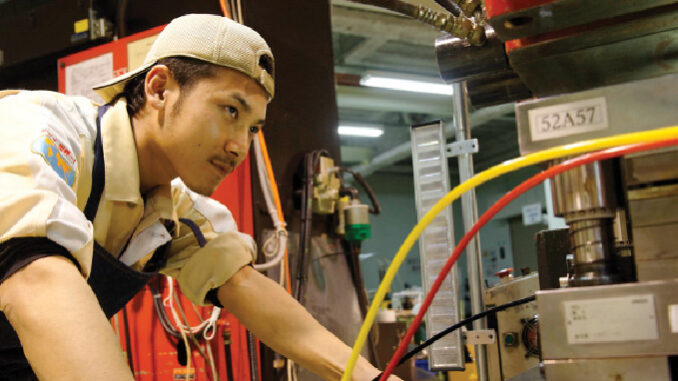
Employers’ responses to union demands in the annual spring labour offensive (Shunto) have inspired newspaper headlines announcing “the biggest wage increases in 30 years”. The Rengo, the largest Japanese trade union federation, announced on March 15th that employers had agreed to an average annual wage increases of 5.28%, above the current 2.2% inflation rate. However, it is far from clear that this signals an end to the fall in real wages of the last few years. In 2023 the average pay increase for Rengo unions was 3.7%. However, average real wages for all workers plummeted by 2.5%, one of the biggest drops in the last 30 years.
The conservative Rengo federation consists mainly of full-time unlimited term contract workers, working in major companies. Including the smaller federations, total union membership in Japan is only 16% of the workforce. Since 2012 some 40% of the workforce has consisted of irregular workers (part time workers and those on limited term contracts). The trade union density of these irregular workers is lower than the regular workers and they are likely to get lower pay increases. The same applies to workers in small and medium-sized companies which employ 70% of all Japanese workers. Initial estimates from the Rengo are for only a 3% rise for these companies.
The figure of 5.8% is also misleading, because it includes the annual increases that regular workers in large companies get under the seniority pay system. This probably accounts for 2% of the increase. Seniority pay increases are far less common amongst irregular workers. These annual increases do not mean much of an increase in wage costs for most companies, and in fact the government has been offering subsidies for companies that are not in the red to raise their wages.
While real wages have fallen in recent years the large companies have had the cash to give genuine inflation-busting pay increases for some time. Successive pro-capitalist governments have even been pushing them to use some of their vast cash reserves to raise wages to provide a boost to the economy. Even the right-wing Yomiuri Shinbun newspaper in an editorial pointed out that “The retained earnings of Japanese firms totalled about ¥555 trillion [approx. US $22bn] in fiscal 2022, marking a record high for the 11th consecutive year. There is widespread criticism of a situation where, despite strong business performance, retained earnings continue to grow instead of the funds being used for investment.” A labour shortage in most industries, pressure from government and fear of worker discontent with higher inflation after 30 years of deflation as well as some expectations of an improvement in the economy have led to at least the larger companies conceding increased pay rises.
However, higher pay increases this year were not the result of a fighting stance adopted by the Rengo’s enterprise-based unions. Often integrated into the management structure, it is not uncommon for there to be a direct career path from union leader/rep to a position in company’s personnel department. These unions are reluctant to engage in any struggle and often only demand what they think the company is willing to pay. In an incident that proved embarrassing for the Rengo. Nippon Steel agreed to a 14.4% pay increase, even though the union had only demanded 10%! A liberal Mainichi newspaper editorial commented that, “Considering that some companies, like Nippon Steel Corp., have even offered wage increases exceeding union demands, Rengo and other labour organizations need to review whether they are fully capitalizing on the growing social pressure on companies to raise wages.” That is probably an understatement.
While most of the leading capitalist countries have seen a growing gap between productivity growth and earnings, in the last 20 years Japan is alone in seeing no growth in real wages at all despite seeing productivity growth around the average. Along with the dramatic increase in the number irregular workers, it’s hard not to conclude that the rotten role of the Rengo leaders is a factor here. At the top the leaders of Rengo have moved to the right. Current leader, Yoshino Tomoko, with the support of the auto-workers, power-workers and electrical workers federations has moved the federation closer to the LDP government, inviting Kishida to attend their congress. This is at a time when support for the Kishida cabinet has plunged to record lows, with a Mainichi newspaper showing only 17% support in February, up from a record low of 14% in January. There is now the prospect of a gap opening up between these leaders and the rank and file.
There was criticism last September of the Rengo leaders lack of support when an affiliate at the Sogo & Seibu Department Store Group held a one day strike, the first in 61 years, in the department store sector. While opposition is in the early stages it is likely to grow. We anticipate there will be attempts to transform these unions and where the leaders are particularly unresponsive even the possibility of break-aways from the Rengo. Where union membership is low there is also the likelihood that some of the smaller independent unions that attempt to organise on an industrial basis could gain strength.
CWI members in Japan fight for the following:
- A real Spring Labour Offensive with co-ordinated strike action to win substantial pay increases for all workers.
- An end to the practice of some unions of refusing to allow irregular workers to join.
- A drive to organise irregular workers and workers in small and medium sized companies.
- The right of public sector workers to strike.
- End the repression against industrially organised unions such as the Kansai Ready Mixed Concrete workers.
- For fighting unions independent of management.
- A radical and reinvigorated labour movement to help create a new party to give a political voice to the working class.

